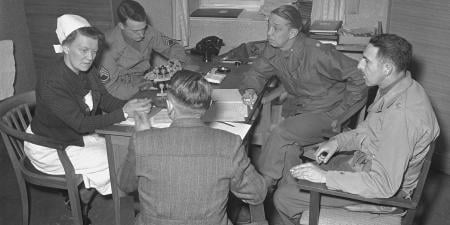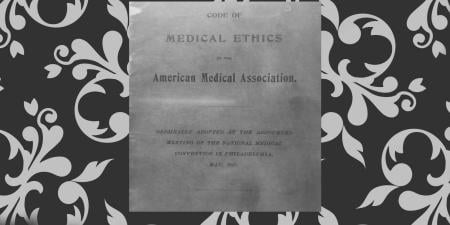Abstract
Immorally acquired information from Nazi experimentation or other sources infects the body of scientific and biomedical knowledge. Responding to this reality ethically means insisting on good teaching about the horrific history of such information’s sources and careful deliberation about how it is referenced and described.
Ethically Fraught Information
I first confronted the issue of the morality of using information obtained from heinous experiments when I was teaching medical ethics at the University of Minnesota, Twin Cities in 1988. I received an email from Robert Pozos, then a physiologist at the University of Minnesota at Duluth and a nationally known expert on hypothermia. Pozos wanted to know my opinion on using information from experiments conducted at the Dachau concentration camp. Nazi scientists had, he told me, used 300 to 400 inmates of the camp as human guinea pigs to determine how people survive or die in extreme cold. They killed about 80 prisoners investigating brutal exposure.1 Inmates, mostly Poles and Russians, were held for hours in tanks of bitterly cold water or left standing naked in freezing weather. Some were frozen to death in attempts to learn how much cold a human could endure. Others were brought near death, then subjected to warming techniques (ie, hot baths or body heat transference from “cuddling” female prisoners) to assess the possibility of recovery.1
Pozos told me that his own studies of cold exposure in human subjects, funded by the United States Armed Forces and private companies with operations in cold environments, had been conducted over many years with institutions’ review and approval and subjects’ consent. Responses to hypothermia available in the 1980s included out-of-body heart bypass to warm the blood, hot humidified air, and warm blankets.2 But Pozos’ studies of hypothermia got nowhere near temperatures that would kill or nearly kill his subjects. Only the Nazis had gone that far, summarizing their findings in reports published in various places, including in the Nuremberg War Trials proceedings.
Pozos thought information gathered in Nazi experiments had value and deserved conversation, so we agreed to hold a conference at the University of Minnesota to consider whether and how to use hypothermia information gathered at Dachau and to review the roles of medicine in the Holocaust. At the time, I was unaware of a seminal article, published years earlier by a journalist, which addressed many questions that interested us.3 Nevertheless, that conference was important: it was one of the first to examine Nazi experiments and a key factor in my researching and publishing my book, When Medicine Went Mad: Bioethics and the Holocaust.4
Distinguishing Applications’ Justifiability
During the conference, we considered a discovery I made that information gathered at Dachau about human beings’ responses to hypothermia had been used by many military organizations in many nations,5 including the United States. It was cited in military circles right after World War II, during a national obsession with the perceived threat from the Soviet Union and preparations for a Cold War that might turn hot (ie, what became the Korean War). Although it was not evident to me when Pozos reached out to me, I later appreciated that information believed by some to aid pursuit of war or national security or to aid responding to perceived terrorist threats presumably was deemed ethically justifiable to use. This rationale was offered by German scientists and physicians at the Nuremberg trials4 and by many others. But not by me.
Neither national security nor war justify torture or use of information gathered from torturous interrogation.
Invoking national security as a reason to use information gathered from immoral research is naïve. National security seemingly justified using information gathered by military psychologists who participated in interrogations using torture in Guantánamo Bay, Cuba, and in the US prison in Abu Ghraib, Iraq.6 But neither national security nor war justify torture or use of information gathered from torturous interrogation. Nor do they either justify suspension of internationally agreed-upon human subjects research protections. However, some—including me 30 years ago4—argue that if there is no other way to save a life or lives, prevent disability, or prevent intense suffering, using immorally acquired information, such as that gathered about hypothermia in Dachau, is justifiable.
Lessons
Knowledge. As I learned from studying the hypothermia experiments at Dachau, questions about using information gathered from grossly immoral experiments can easily morph into a debate about justifying past use or continued use but not about that information’s wider effects on knowledge or how we should orient ourselves to knowledge arising from empirically or ethically flawed sources. Tainted information—gathered by Nazis at Dachau, US Public Health Service researchers at Tuskegee, or others—tends to be used if it has practical application. But tainted information infects the body of scientific and biomedical knowledge, silently becoming a part of that body. This silent becoming, however, should be regarded as ethically and epistemically problematic when the immorality of that information’s source or means of acquisition is subsumed—rendered invisible—by the general legitimacy of that broader body of knowledge. Managing this reality responsibly and ethically requires insistence upon good teaching about the horrific history of this information’s creation and careful deliberation about how it is referenced and cited in journals, books, exhibitions, clinical practice guidelines, award presentations, talks, and other sources.3,4,7
Application value. If information from the Dachau hypothermia experiments was useless, then the need to debate when, how, and where it should be referenced would evaporate. Like Pozos, many believed that information gathered at Dachau had value.1 But others have argued that information gathered from sick, starving, and stressed subjects is of little, if any, scientific value.1 Reliance on better or alternative sources of information deemed useful has also informed discussion about using the Atlas of Topographical and Applied Human Anatomy, which depicts dissection studies on victims of Nazi atrocities, as an anatomical reference.8,9,10 But alternatives to immorally sourced information do not always exist, as is the case for information gathered at Dachau from freezing (emaciated) persons to death. Yet even when legitimate scientists argue persuasively that immorally sourced information has scientific value, ethical questions about that information’s use persist.8
Moral standing. Some survivors of Nazi concentration camps who were alive in 1989 attended the conference we organized in Minnesota. Some were subjects in experiments other than the hypothermia experiments, some were in concentration camps as children but were not experimental subjects, and some were children of Holocaust victims.4 Although not all victims of Nazi experimentation were Jewish,4 Jewish religious authorities shared their views during the conference, as did research ethics scholars, American physicians, British physicians, and members of the media. I even sought the opinion of my father who, as a medic in the 45th Infantry Division of the 2nd Chemical Mortar Battalion, was among the troops who liberated the Dachau camp.11 In 1989, the views of Holocaust survivors were seen as carrying substantial, if not extra, moral heft. As the survivors and witnesses died, their opinions seemed to be less often invoked, which suggests the importance of their written or recorded opinions about what they experienced and believed.
Description. Questions about how to characterize information or its means of acquisition in Nazi camps had little influence on early debates about this information’s use, but examples of important neglected questions that deserve consideration are these: Should observations of how people froze to death, for example, be described as information (as I’ve used the term in this article), findings, data, torture, facts, or something else? Should Nazi experiments, as I’ve been calling them in this article, be called experiments, protocols, research, trials, barbaric exposure, or something else? Should the camp personnel who administered or designed the experiments be called scientists, German scientists, Nazi scientists, perpetrators, quacks, monsters, or something else?7 The language we use to represent what happened is ethically important for many reasons, including whether we place these nouns linguistically within or outside the scope of what we’re willing to call biomedicine. If that enterprise is described as biomedical, its social and cultural authority and legitimacy are conferred upon what is described within its scope, so the normative significance of our descriptors underscores the importance of our obligation to be thoughtful, careful, and respectful in our word choices in this debate.
My own view is that the hypothermia experiments were conducted by expert German scientists who intended to create valid data for military application. So-called experiments in camps other than Dachau were carried out by inept sadists to maim and torture and do not merit description as science even when carried out by physicians. The history of medicine reveals innumerable instances of mainstream clinicians and scientists doing horrific things with the best techniques of their time to do what they believed to be important science, to generate what they intended to be data, and to produce what they hoped would be useful applications.10 This history must be acknowledged if we are to grapple, as we should, with biomedicine’s ethically fraught past.7
References
- Berger RL. Nazi science—the Dachau hypothermia experiments. N Engl J Med. 1990;322(20):1435-1440.
-
Hypothermia prevention. MMWR Morb Mortal Wkly Rep. 1988;37(50);780-782.
-
Moe K. Should the Nazi research data be cited? Hastings Cent Rep. 1984;14(6):5-7.
-
Caplan AL, ed. When Medicine Went Mad: Bioethics and the Holocaust. Springer Science Business Media; 1992.
-
Alexander L; Combined Intelligence Objectives Sub-committee. The Treatment of Shock From Prolonged Exposure to Cold, Especially in Water. Office of the Publication Board, US Department of Commerce; 1945.
-
Soldz S. When American psychologists use their skills for torture. Quartz. July 26, 2015. Accessed September 23, 2020. https://qz.com/462911/when-american-psychologists-use-their-skills-for-torture/
-
Nieman S. Learning from the Germans: Race and the Memory of Evil. Farrar Straus & Giroux; 2019.
-
Caplan A. Commentary: consulting evil. Surgery. 2019;165(5):870.
-
Mackinnon S. When medical information comes from Nazi atrocities. BMJ. 2020;368:l7075368.
-
Miles SH. The Torture Doctors: Human Rights Crimes and the Road to Justice. Georgetown University Press; 2020.
-
Malachowski J. Framingham veteran recalls shock at seeing Dachau camp. Daily News. December 28, 2014. Accessed May 18, 2020. https://www.metrowestdailynews.com/article/20141228/NEWS/141227620



